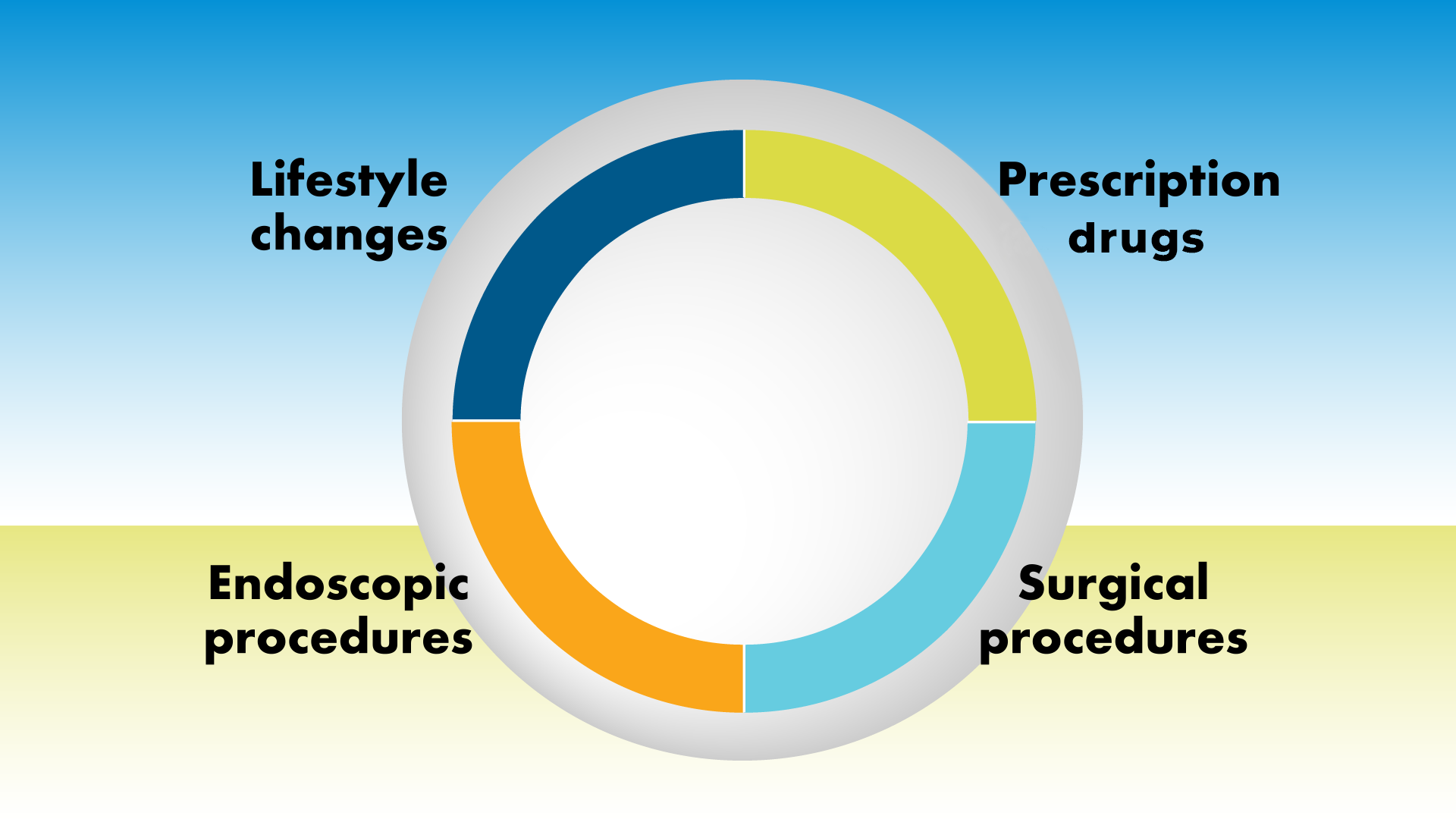Welcome to the Obesity Resource Center
Reaching and maintaining a weight that supports your health can be challenging, but you don’t have to face it on your own. More than 40% of American adults live with obesity. The good news? There are many ways to manage living with obesity.
Overview
What is obesity?
Obesity is a chronic, complex, and treatable disease. It is associated with having an excess amount of body fat. It is healthy to have some body fat. In fact, a healthy level of body fat is needed to survive. But too much fat can be harmful to your body. Studies have shown a link between obesity and a higher risk of many health issues, but with treatment and support, these risks can often be reduced or managed.
Body fat is hard to measure directly. Body Mass Index (BMI) is one tool health care providers use to measure obesity. It is a calculation of body weight compared with height. National guidelines define obesity based on BMI:
- Someone is generally considered within a healthy weight range if their BMI is 18.5–24.9.
- Someone is overweight if their BMI is 25.0–29.9.
- Someone has obesity if their BMI is 30 or higher.
While BMI is the most common way to measure obesity, there are some limitations. It does not take into account other factors like muscle mass, age, and overall health, for example.
To figure out your BMI, use this online calculator.
How does obesity impact health?
Obesity is one factor that can contribute to harmful health effects, but with treatment and support, these risks can often be reduced or managed.
Obesity impacts the way fat cells act in your body. For example, having excess fat cells can cause low-level inflammation (swelling) throughout your body. This can harm your blood vessels, muscles (including the heart), and organs (like the liver and pancreas). Inflammation can raise your risk for many types of cancer. It can also cause joint and muscle pain, and breathing problems at night (called obstructive sleep apnea).
Studies have shown a link between people living with obesity and a higher risk of many health issues, including:
- Heart disease
- Stroke
- Type 2 diabetes
- Metabolic dysfunction-associated steatotic liver disease (MASLD)
- Certain types of cancer (like endometrial, breast and colon cancer)
- Infertility
- Osteoarthritis
- Anxiety
- Depression
- Sleep apnea
- Chronic pain
- High blood pressure
- High cholesterol
- High triglycerides
What can contribute to obesity?
Obesity can run in families. If a person has a parent or grandparent living with obesity, they may be at higher risk. Genetics (DNA passed from parent to child) and shared lifestyle and environment can contribute to obesity.
In today’s busy world, it can be challenging to find time to cook at home. Many people rely on eating out or choosing fast, convenient options. These foods can sometimes be higher in calories and lower in nutrients or fiber. Portion sizes and food availability can also make it harder to maintain balanced eating habits. For many individuals and families, affordable and convenient foods are often easier to access than fresh, nutrient-dense options.
Regular movement can improve your overall health and well-being. Many of us spend a lot of time in cars or on screens, which can make daily movement harder. You don’t need a gym or special equipment. Even small amounts of movement throughout the day — in ways that fit your abilities, preferences, and daily life — can have benefits for your body and mind and make movement more sustainable, even without major weight loss.
Your body makes hormones (chemicals that control how tissues and organs work). Some of these hormones help signal hunger and fullness. In people with obesity, the hormones that tell the body when it’s hungry or full don’t always work right.
Excess fat can come from other health issues or from the treatment of those issues. For instance, low thyroid hormones can slow metabolism (how your body turns food into energy) and contribute to weight gain. Some medications can also contribute to weight gain.
Many people use food as comfort during times of stress, anxiety, or depression. This is a common response, and support is available to help you find other ways to cope and build a positive relationship with food. Weight stigma, bias, body image issues, and low self-esteem can also cause people to avoid others and move less. Psychological issues can affect sleep, which may also lead to weight gain.
The gut microbiome is made up of trillions of bacteria and other microorganisms that live in the human digestive tract. It can contribute to obesity. Studies show that the gut microbiome works differently in people with obesity compared to people without obesity.
There are many ways you can help manage or treat obesity. If you’re looking for help or you’re supporting a loved one living with obesity, you’re not alone. You’re in the right place.
Treatment options
Managing obesity can be hard. There are many safe and effective ways to help. Talk with your health care provider about which options may be right for you.
Lifestyle changes to manage weight — and overall wellness — include the way you eat and move. No matter what plan your health care provider suggests, nutrition and regular movement are usually also recommended. Limiting portion size, adding high-fiber and nutritious foods (like fruits and vegetables), and moving more can lead to improved health in the long term. Explore these lifestyle changes on your own or with family or friends. You may also explore them as part of an obesity management program, which could include meeting with a registered dietitian.
If lifestyle changes haven’t led to desired results, your health care provider may suggest a medicine to manage your weight. Most medications work by making you feel full faster or feel less hungry, causing you to eat less. Talk to your health care provider about which drug is right for you. You need to know about possible side effects, and if they can’t be taken with other medications you may be on. You should also ask your health care provider about over-the-counter medications before trying any.
Endoscopic procedures use a flexible tube with a camera to reach the stomach through the mouth. These procedures temporarily fill or change the shape of the stomach. This can help make you feel full faster and can contribute to weight-loss efforts.
Obesity surgeries (like laparoscopic sleeve gastrectomy, laparoscopic Roux-en-Y gastric bypass, or modified duodenal switch) are major surgeries that make the stomach smaller. These surgeries call for ongoing lifestyle changes and regular check-ins with your health care team.
Decision tool

How to talk with your health care provider about weight loss and treatment options:
It’s important to talk with your health care provider about your concerns and what weight management and treatment options may be right for you. It can be a hard topic to bring up, but open communication with your provider is a key step in your health journey.
Use this tool to start the conversation. When your provider understands your health, personal history, and goals, you can work together to find the right option(s) for you.
Consider asking these questions to start the conversation.
- What health and lifestyle factors might increase my risk for other health issues?
- What health issues should I be aware of?
- How can I best support my body’s health?
- What lifestyle changes could support my overall health?
- What next steps would you suggest to help me care for my physical and mental health?
Describe your health concerns, including any conditions you may have.
- Tell your provider about any conditions you have.
- Remind your provider about any medications you are currently taking.
Explain where you are on your weight loss journey.
- Tell your provider about your history. This can include how long you’ve been at your current size and whether you’ve gained or lost weight throughout your life.
- Describe any past efforts to change your lifestyle and what approaches you’ve tried.
- Tell them how you’re feeling about your size. This can be hard, but it’s important for them to understand what you’re experiencing.
- Talk about your health goals and hopes for the future.
Ask what option(s) might be right for you.
Here are factors your health care provider will likely want to discuss and consider before making any recommendations:
- Your overall health and any conditions you have.
- Your past efforts to change your lifestyle.
- Your health goals.
- Your Body Mass Index (BMI). This is a calculation of body weight compared with height. It is one tool health care providers use to measure obesity. While BMI is the most common way to measure obesity, there are some limitations. It does not take into account other factors like muscle mass, age, and overall health for example.
Once your health care provider understands your history and goals, you can discuss options to optimize your health. They might include a combination of lifestyle changes, prescription drugs, endoscopic procedures, and surgical procedures.
Lifestyle changes
Nutrition and physical activity are two of the best ways to manage weight and improve your health. Learn more about these healthy habits.
Nutritional information can be confusing and misleading. Here are some tips and resources to help support proper nutrition. Please talk with your health care provider or a registered dietitian if you have any health conditions.
Use MyPlate to plan healthy, well-balanced meals.
When you’re making a meal, try to include:
- ½ plate non-starchy veggies (like spinach, broccoli or peppers).
- ¼ plate lean protein (like low-fat cuts of red meat, chicken, seafood or tofu).
- ¼ plate whole grains, fruits or starchy vegetables (like potatoes, corn, peas or beans).
Reduce added sugar.
Some foods, like fruit, naturally have sugar. Many foods and drinks have added sugar — like sodas, candies, and desserts. Added sugars can also be found in processed foods that you wouldn’t expect, like salad dressings, condiments, pasta sauce, breads, and cereals. When you’re choosing food, be sure to:
- Read the nutrition label to find out how much added sugar there is. It’s listed below the total sugar.
- Limit added sugar to less than 36 grams, or 9 teaspoons, per day (for men) or 24 grams, or 6 teaspoons, per day (for women).
- Choose drinks without added sugar — like plain water, sparkling water, and unsweetened tea, or coffee. One 12 oz can of soda can have 39 grams of sugar.
- Choose foods or drinks with high fructose corn syrup less often.
Skip fad diets.
New diets come and go all the time. For example, high-fat, high-protein, and low-carb diets, like keto or paleo, have been popular recently. For your health and safety, keep in mind that:
- Some diet plans can be very restrictive or difficult to maintain long-term. A flexible, balanced approach that fits your lifestyle is more likely to support lasting health.
- Cutting out or greatly limiting certain groups of foods can lead to nutrient deficiencies. It is best to have different nutrients from all the food groups.
- Another popular way to diet, called intermittent fasting, may be helpful for weight management. But it’s important that you talk with your health care provider or a registered dietitian first to make sure it’s right for you.
Try the Mediterranean approach if you’re looking for a new way of eating.
If finding a new way of eating is important to you, experts recommend the Mediterranean diet. It focuses on:
- Fruits and vegetables (at least 5 servings per day, such as 3 vegetables and 2 fruits).
- Lean proteins (like chicken, fish, eggs, beans, and lentils), low-fat dairy products, and healthy fats (like nuts, seeds, avocados, and olive oil).
- More whole grains (like whole wheat bread or brown rice) and fewer refined grains (like white bread or white rice).
- More whole foods (like fruits, vegetables, and nuts that are found in nature) and fewer processed foods (like chips, sodas, or snack bars) overall.
WRITTEN BY

Lorraine Bonkowski, RDN, and Lauren Cornell, MS, RDN
Reviewed by DIGID Workgroup members ©June 2022
The U.S. Centers for Disease Control and Prevention recommend at least 150 minutes, or 2 ½ hours, of moderate intensity activity every week. That’s 30 minutes a day, 5 days a week. During moderate intensity exercise, you can still talk, but you can’t sing because you’re breathing faster than usual. These tips can help:
- Try activities you enjoy like gardening, walking, biking, water aerobics, and tennis.
- Do what works for your schedule and lifestyle. For instance, it may be easier to fit in 2 to 3 10-minute walks each day rather than one longer one.
- Start with whatever you can do. Every little bit of movement helps, and you can always build up to more.
WRITTEN BY

Lorraine Bonkowski, RDN, and Lauren Cornell, MS, RDN
Reviewed by DIGID Workgroup members ©June 2022
Prescription drugs
If lifestyle changes have not led to desired results, there are medications that your health care provider might recommend. Below are the names and the common brand names (in parentheses) for each drug.
Slows down digestion.
Controls appetite and makes you feel full faster and for longer.
Lowers appetite, helps with cravings, and makes you feel full faster.
Reduces the amount of fat the body absorbs from food.
A short-term option to reduce your appetite.
Lowers appetite and makes you feel full faster.
A weekly injection that reduces appetite and controls food intake.
An injection for the treatment of genetic obesity caused by a rare gene mutation.
A weekly injection that makes you feel full and slows food passage through the digestive system.
Other medications that help curb appetite include: benzphetamine, diethylpropion and phendimetrazine.
Drugs for weight management should not be used alone. Most work best when combined with proper nutrition and physical activity. All of these medications have side effects. Based on other drugs you may be taking and your medical history, weight-loss drugs may or may not be the right choice for you. Be sure to talk with your health care provider before taking any prescription drugs, over-the-counter medications, or supplements.
Endoscopic procedures
There are several endoscopic procedures that can help with weight management. These procedures reduce the size and sometimes the function of your stomach. This is done to make you feel full and eat less. These procedures are usually done without large cuts or an overnight hospital stay.
One or more balloons are filled with saline and placed in the stomach during an endoscopy, which fills the stomach space. This leads to decreased hunger and an increased feeling of fullness. The balloon is removed after six months.
A suturing device is inserted into the throat and down to the stomach to decrease space in the stomach. This creates the same results as sleeve gastrectomy surgery, but it is less invasive.
A device is attached to the outside of the body to reduce the number of calories absorbed.
An injection directly into the stomach lining freezes the stomach muscles. This decreases stomach contractions and slows down digestion.
Surgical procedures
Your health care provider may discuss weight loss surgery with you if you have obesity. These procedures involve making the stomach smaller (called restriction). Some also limit what your body can absorb (called malabsorption). They are significant surgeries that often involve losing weight beforehand. They usually require ongoing lifestyle changes and monitoring by your health care team.
Involves closing off 75% of the stomach with the remaining 25% forming a thin tube, or sleeve, that is joined to the intestines.
Often referred to as gastric bypass. It is a surgery that makes the stomach smaller and causes food to bypass part of the small intestine. This limits calories and nutrients absorbed.
Reduces the size of the stomach opening and pouch, which makes you feel fuller faster.
Usually referred to as the duodenal switch. This is a complex surgery that reduces your ability to absorb calories, vitamins, and minerals.
A complex surgery that reduces the size of the stomach and shifts the digestive channel to limit the calories absorbed by the body.
Based on your health care provider’s recommendations, ask these important questions:
- How effective is this approach for most people?
- Would this be safe for me?
- What are the potential risks or side effects?
- What would I need to do before to get ready for the treatment?
- What will I need to do afterward to make sure this treatment is safe and effective?
Obesity and MASLD
Obesity can increase the risk of many health conditions, including gastrointestinal (GI) conditions, which are conditions related to the digestive system. But with treatment and support, these risks can often be reduced or managed. Maintaining a healthy weight is a key factor in improving certain digestive health issues, including metabolic dysfunction-associated steatotic liver disease (MASLD).
MASLD happens when your liver stores too much fat. It is not related to alcohol use. Nearly 40% of adults in the U.S. have MASLD, making it one of the most common liver diseases.
How can weight management help with MASLD?
People who are overweight or have obesity are at a higher risk of MASLD. They may also be at higher risk of developing other conditions like metabolic dysfunction-associated steatohepatitis (MASH) or cirrhosis.
Weight management and medical care can help reduce fat in the liver, inflammation (swelling), and fibrosis (scarring) associated with MASLD and MASH. If a reduction in BMI and an increase in physical activity is achieved in time, MASLD and MASH can be slowed or even reversed.
What can I do next?
Here are some steps you can take today to address your MASLD symptoms and find the weight management option that’s right for you:
- View a video about obesity and health.
- Learn more about healthy eating and physical activity for MASLD.
- Read about obesity treatment options.
- Check out this decision tool before your next appointment with your gastroenterologist or other health care provider.
- Find out what obesity treatment options your insurance covers.
Gastroesophageal reflux disease (GERD) occurs when stomach acid frequently flows back into the esophagus. While GERD is not life threatening, it can be very uncomfortable and impact your quality of life.
GERD is sometimes referred to as acid reflux. The most common symptom of GERD is frequent and severe heartburn.
Being overweight or having obesity is most likely causing your GERD symptoms or making your symptoms worse.
How can weight loss help with GERD?
Extra weight can put pressure on your abdomen, causing or worsening acid reflux. Losing weight can help remove extra fat and pressure around the abdomen, which can help you feel better.
What can I do next?
Here are some steps you can take today to address your GERD symptoms and find the weight loss option that’s right for you.
- View a video about obesity and health.
- Learn more about healthy eating and physical activity for GERD.
- Read about weight loss treatment options.
- Check out this decision tool before your next appointment with your gastroenterologist or other health care provider.
- Find out what weight loss options your insurance covers.
Metabolic dysfunction-associated steatotic liver disease (MASLD) occurs when your liver stores too much fat and it is not related to alcohol use. Nearly 40% of adults in the U.S. have MASLD, making it one of the most common liver diseases.
How can weight loss help with MASLD?
People who are overweight or have obesity are at a higher risk of MASLD. They are also more likely to have worse symptoms and eventually have metabolic dysfunction-associated steatohepatitis (MASH) or cirrhosis.
Weight loss can help reduce fat in the liver, inflammation (swelling) and fibrosis (scarring) associated with MASLD and MASH. If healthy weight is achieved in time, MASLD and MASH can be reversed.
What can I do next?
Here are some steps you can take today to address your MASLD symptoms and find the weight loss option that’s right for you:
- View a video about obesity and health.
- Learn more about healthy eating and physical activity for MASLD.
- Read about weight loss treatment options.
- Check out this decision tool before your next appointment with your gastroenterologist or other health care provider.
- Find out what weight loss options your insurance covers.
Insurance coverage
If you’re thinking about obesity or weight management counseling or treatment, it’s a good idea to check what your health insurance will or will not pay for. Some weight management programs, services, and treatments are covered by insurance plans. But each plan is different, so it’s important to check with your insurance provider.
When you are discussing options with your health care provider, be sure to check your insurance coverage. Your health care provider may be able to recommend options that your insurance covers. For some options, you or your health care provider may need to ask for pre-approval from your insurance company.
Many health plans DO cover:
- Working with a registered dietitian or wellness coach on lifestyle changes, such as nutrition and physical activity.
- Certain prescription drugs and weight management procedures.
Most health plans DO NOT cover:
- Surgical procedures for weight loss, especially if you haven’t tried other weight management options first.
Don’t assume anything. Before starting treatment, check with your insurance company to make sure it will be covered.
- Talk to your health care provider. Sometimes, the way a condition is diagnosed or described in your medical record can affect if insurance will pay for treatment. Or your provider may be able to recommend a different option(s) that would be covered.
- Ask what the self-pay rate is for the treatment. Sometimes you can pay less if you are paying directly, without using insurance.
- Call your insurance company’s customer service department and ask:
- Why the treatment wouldn’t be covered.
- What evidence they need to change the decision.
- What treatment options would be covered.
- If you have started treatment and then been denied coverage, you can appeal the decision. All insurance companies have a process to do this. Sometimes your health care provider can help you with the appeal process.
The American Gastroenterological Association (AGA) is a member of the Obesity Care Advocacy Network. As part of the network, AGA supports the Treat and Reduce Obesity Act (TROA).
TROA would expand Medicare to include coverage for prescription drugs for chronic weight management, behavioral counseling, and other prevention and treatment options.
Many private insurance companies base their coverage decisions on Medicare. So, if Medicare improves coverage for comprehensive weight management treatments, private insurance companies are likely to do the same.
REVIEWED AND UPDATED BY
Pooja Singhal, MD, AGAF, gastroenterologist, hepatologist, and obesity medicine specialist at Oklahoma Gastro Health and Wellness
Amy Stewart, CRNP, Capital Digestive Care, Washington, DC
Melaine Smith, patient advocate
This program is supported by an independent grant from Novo Nordisk.
Updated November 2025
Questions and resources for every stage of your weight loss journey
Are you just starting out on your weight loss journey?
Do you want some help talking with your health care provider about weight loss?
Do you have MASLD and wonder if weight loss can help?
Do you want to know what weight loss options your health insurance covers?













